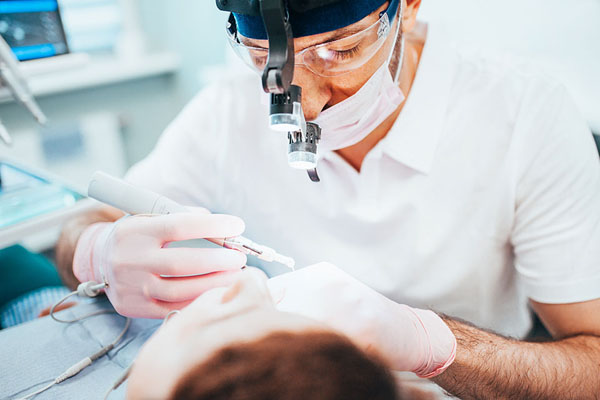Achieve Your Best Smile at AZ Implant & Denture Center
Porcelain dental crowns restore and enhance the appearance of damaged, discolored, or misaligned teeth. Dental crowns have helped several patients achieve the durable, stunning smiles they deserve.
Learn more about porcelain crowns with our board-certified dentist in Sun City West and see how they can help you restore your beautiful smile by calling (623) 214-7898 to schedule your consultation.

What Are Porcelain Crowns?
Porcelain crowns, also known as ceramic crowns or porcelain teeth, are tooth-shaped caps that are placed over a damaged or weakened tooth to restore its strength, size, shape, appearance, and function. They’re a popular choice for restoring teeth because they are durable and look very natural.
Types of Porcelain Crowns
- Full Porcelain/Ceramic Crowns: These are fully made of porcelain. They offer the best natural color match than any other crown type and are often more suitable for people with metal allergies.
- Porcelain-fused-to-metal (PFM) Crowns: These have a metal base or interior with porcelain on the outside. This combination offers strength (from the metal) and aesthetics (from the porcelain). One potential downside is that the metal can sometimes show as a thin, dark line at the gum line.
Porcelain Dental Crown Benefits
Porcelain crowns offer a range of benefits, including:
- Durability: Porcelain crowns are known for their strength and durability, and can withstand the daily wear and tear of chewing and speaking.
- Aesthetics: Porcelain can mimic the appearance of natural teeth, and porcelain crowns are designed to blend seamlessly with your natural teeth for a natural-looking smile.
- Stain-Resistance: Porcelain is resistant to staining, which means your porcelain crowns will remain bright and white over time.
- Versatility: A porcelain crown can address a range of dental issues, from chipped and cracked teeth to misshapen or discolored teeth.
Drawbacks of Porcelain Crowns
While porcelain crowns offer many benefits, there are also some drawbacks to consider, including:
- Cost: Porcelain crowns can be more expensive than other types of dental restorations, such as composite fillings or metal crowns.
- Sensitivity: Some people may experience increased sensitivity after getting a porcelain crown.
- Potential for Chipping: While porcelain is durable, it’s not indestructible. Porcelain crowns can chip or crack if they’re exposed to excessive force or trauma.

The Porcelain Crown Process
Consultation and Evaluation
During this appointment, our Arizona dentist will evaluate your teeth and discuss your treatment goals and options. They may take X-rays or impressions of your teeth to help plan the treatment.
Tooth Preparation
Once you and your dentist have decided on porcelain crowns as the best solution, the next step is to prepare the affected teeth. Dr. Cooper will remove any decay or damage from the tooth and shape it to fit the crown. This may involve removing some of the enamel from the tooth’s surface.
Impressions
After your tooth has been prepared, we’ll take an impression or mold of the tooth. This impression will be used to create a custom-fit porcelain crown that matches the size and shape of your natural tooth.
Temporary Crown
While your custom crown is being crafted in a dental lab, your dentist will fit you with a temporary crown. This will protect the prepared tooth and maintain your bite and tooth alignment while the permanent crown is being made.
Crown Placement
Once your custom porcelain crown is ready, you’ll return to the dentist’s office for the final placement. Dr. Cooper will remove the temporary dental crown and replace it with the permanent porcelain crown, making any necessary adjustments to ensure a comfortable fit and natural appearance.
Follow-Up
After your porcelain crown has been placed, schedule a follow-up appointment to ensure the crown is functioning properly and to check for any sensitivity or discomfort. With proper care and maintenance, your porcelain crown can last for many years to come.
Porcelain Crown Alternatives
The right choice of dental treatment will depend on your specific dental needs, aesthetic preferences, and budget. Here are some potential alternatives:
- Composite Resin: Composite is a tooth-colored filling material that can be used in certain situations instead of a crown. Composite fillings can restore a tooth that has a significant amount of structure missing, but they may not offer the same level of strength and durability as crowns. They’re often more affordable than a dental crown.
- Gold Crowns: Gold is one of the oldest materials used for dental crowns. It’s durable, non-abrasive, and requires less tooth reduction than porcelain or porcelain-fused-to-metal crowns. Some people prefer the appearance of gold, especially for back teeth, while others do not like the metallic look.
- Zirconia Crowns: Zirconia is a type of ceramic that’s known for its durability and strength. These crowns are tooth-colored and can be a good option for people who want both aesthetics and strength. They’re also metal-free, which can be advantageous for patients with metal allergies or sensitivities.
- CEREC® (Chairside Economical Restoration of Esthetic Ceramics) Crowns: This is a system that allows dentists to design, fabricate, and place a crown in just one visit. The crown is made from a block of ceramic material and is designed using computer-aided design/computer-aided manufacturing (CAD/CAM) technology. These are also known as same-day crowns.
- Onlays or Inlays: Rather than covering the entire tooth, onlays or inlays only replace a portion of the tooth. They can be made of porcelain, gold, or composite resin and might be suitable for teeth that don’t require full coverage but have too much damage for a simple filling.
- Dental Veneers: For front teeth that are mostly intact but have aesthetic issues, veneers can be a more conservative alternative. They’re thin porcelain shells that are bonded to the front surface of the teeth to improve their appearance.

Frequently Asked Questions
With proper care and maintenance, porcelain crowns can last 10 to 20 years. However, their lifespan can vary depending on factors such as oral hygiene practices, diet, and the amount of wear and tear they experience. Porcelain crowns are known for their durability and longevity.
Porcelain crowns can be more expensive than other types of crowns and dental restorations due to the high-quality materials and custom craftsmanship involved. The cost can vary depending on factors such as the complexity of the case, the number of crowns needed, and the geographic location of the dental practice.
Porcelain is highly resistant to staining and discoloration, and porcelain crowns are designed to remain bright and white over time. To prevent discoloration, maintain good oral hygiene practices and avoid consuming these substances in excess. Additionally, regular dental cleanings can help remove any surface stains and keep your porcelain crowns looking their best.
Do You Need a Dental Crown? Discover Your Options!
If you’re considering porcelain crowns to restore your smile, contact AZ Implant & Denture Center at (623) 214-7898 to discuss your options. With proper care and maintenance, porcelain crowns can provide a long-lasting and aesthetically pleasing solution to a range of dental issues.
Call our Sun City West dental office today to schedule a consultation and begin your journey to a restored smile.

